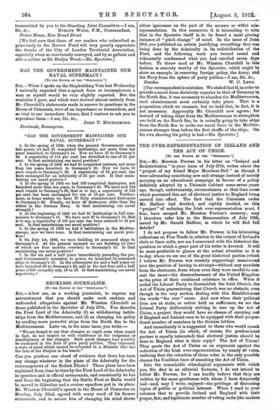THE OVER-REPRESENTATION OF IRELAND AND THE ACT OF UNION.
[To TDB EDITOR Or THE "SPECTATOR."] SIR,—Mr. Moreton Frewen in his letter on "Ireland and Redistribution " in your issue of July 27th, writes about the " project of my friend Major Morrison-Bell " as though I were advocating something new and strange instead of merely carrying on an educational campaign in favour of a policy definitely adopted by a Unionist Cabinet some seven years ago, though, unfortunately, circumstances at that time arose which prevented this act of electoral justice to England being carried into effect. The fact that the Unionists under Mr. Balfour had decided, and rightly decided, on this "project" of reducing the Irish over-representation must, I fear, have escaped Mr. Moreton Frewen's memory ; may I therefore refer him to the Memorandum of July 1905, issued by Mr. Gerald Balfour, in which he will find full details ?
I do not propose to follow Mr. Frewen in his interesting reflections on Free Trade in relation to the output of Ireland's cloth or linen mills, nor am I concerned with the historical dis- quisition to which a great part of his letter is devoted. It will be more profitable to glance at the actual situation as it is to-day, where we see one of the great historical parties (which I believe Mr. Frewen was recently supporting) manoeuvred into the position of having to attempt—without any mandate from the electorate, from whom even they were careful to con- ceal the issue—the dismemberment of the United Kingdom as the price of their continued existence in office. When it suited the Liberal Party to disestablish the Irish Church, the Act of Union guaranteeing that Church was no obstacle, even though in the very section dealing with this Establishment the words "for ever" occur. And now when their political lives are at stake, or rather held on sufferance, we see the Liberal Party deliberately striving to tear up the Act of Union, a project they would have no chance of carrying out if England and Ireland were to be equipped with their propor- tional number of members in the division lobbies.
And immediately it is suggested to those who would smash the Act of Union (in which, of course, the predominant partner is equally interested) that electoral justice should be done to England what is their reply ? The Act of Union! They quote the Act of Union as an argument against the reduction of the Irish over-representation by nearly 40 votes, realizing that the retention of these votes is the only possible chance the Coalition have of smashing the Act of Union.
Into the remarkable ethnological arguments with which you, Sir, deal in an editorial footnote, I do not intend to follow Mr. Frewen, for I can hardly believe that they are written by the same gentleman with whom I have frequently had—and, may I write, enjoyed—the privilege of discussing topics of public or political interest. When I read in your columns that to provide Ireland and England with their proper, fair, and legitimate number of voting units (the modern robe of the member of Parliament, and by means of which voting units great measures equally affecting both countries are ultimately and solely decided)—when I read that this is going to make Irishmen become Italians and " handle knives " L cannot refrain from the reflection that Mr. Moreton Frewen is doing his adopted country ill service, and the Irish character a gross injustice ; and to suggest that the granting to England of equal voting power in the lobbies of the House of Commons is to render "the life of the wearer of the Crown not safe against the blade of the assassin" is nothing less than unmiti- gated nonsense, and I will add nonsense of a most mischievous and pernicious character.—I am, Sir, &c.,





































 Previous page
Previous page